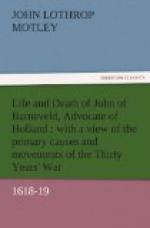As the controversy grew hot in the university between the Arminians and their adversaries, Mr. Robinson, in the language of his friend Bradford, became “terrible to the Arminians . . . . who so greatly molested the whole state and that city in particular.”
When Episcopius, the Arminian professor of theology, set forth sundry theses, challenging all the world to the onset, it was thought that “none was fitter to buckle with them” than Robinson. The orthodox professor Polyander so importuned the English Puritan to enter the lists on behalf of the Contra-Remonstrants that at last he consented and overthrew the challenger, horse and man, in three successive encounters. Such at least was the account given by his friend and admirer the historian. “The Lord did so help him to defend the truth and foil this adversary as he put him to an apparent nonplus in this great and public audience. And the like he did a second or third time upon such like occasions,” said Bradford, adding that, if it had not been for fear of offending the English government, the university would have bestowed preferments and honours upon the champion.
We are concerned with this ancient and exhausted controversy only for the intense light it threw, when burning, on the history which occupies us.
Of the extinct volcano itself which once caused such devastation, and in which a great commonwealth was well-nigh swallowed up, little is left but slag and cinders. The past was made black and barren with them. Let us disturb them as little as possible.
The little English congregation remained at Leyden till toward the end of the Truce, thriving, orderly, respected, happy. They were witnesses to the tumultuous, disastrous, and tragical events which darkened the Republic in those later years, themselves unobserved and unmolested. Not a syllable seems to remain on record of the views or emotions which may have been excited by those scenes in their minds, nor is there a trace left on the national records of the Netherlands of their protracted residence on the soil.
They got their living as best they might by weaving, printing, spinning, and other humble trades; they borrowed money on mortgages, they built houses, they made wills, and such births, deaths, and marriages as occurred among them were registered by the town-clerk.
And at last for a variety of reasons they resolved to leave the Netherlands. Perhaps the solution of the problem between Church and State in that country by the temporary subjection of State to Church may have encouraged them to realize a more complete theocracy, if a sphere of action could be found where the experiment might be tried without a severe battle against time-hallowed institutions and vested rights. Perhaps they were appalled by the excesses into which men of their own religious sentiments had been carried by theological and political passion. At any rate depart they would; the larger half of the congregation remaining behind however till the pioneers should have broken the way, and in their own language “laid the stepping-stones.”




